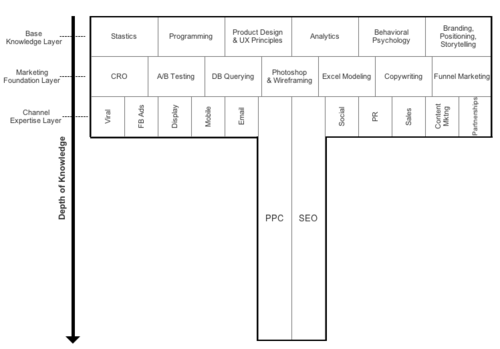Hiring for your growth team can be really hard. Part of the problem is that the role covers a bunch of skills, and a little bit of magic. Let’s demystify it.
This is actually part of a longer lecture in our premium growth class. Check out the lecture here.
1. Start With Your Team
You need to understand how this growth role is going to fit in with the rest of your team. This varies by company size and how you normally make decisions. One factor is whether you have a dedicated growth team vs growth managers distributed. This affects who owns the metrics and how you decide who works on what.
2. Understand the Skills
Your growth team members will not be searching for silver bullets. They’ll be grinding away on lots of lead bullets. So what skills will they need? CRO, SEM, SEO, SQL, BBQ, ASO, PR, viral, PPC, PBJ, referrals, partnerships — the list is very long and confusing. I’m 80% sure some of these acronyms are just made up.
Identify the areas you’ll need eventually and what you’ll need right away.

3. Match with Candidate Experience
The #1 mistake in growth is thinking something can come and solve all your problems. This thinking infects hiring for growth: we need someone who can do it all and has done it before. The problem is that the best people are probably not hirable by your young company.
Match up the skills you need with the experience you want to find. So you’re probably not hiring a growth manager — you’re hiring a marketing or product manager — or maybe an engineer. The career of a growth manager follows this T-Shape, going deep in a specific set of skills built upon a broad base of skills.
Understanding this will help you find folks with the right experience for the things they must know right away.
4. Real Assessment Tests
The best way to assess someone for a role is to test the specific skills you’re going to ask them to do in that role. The best assessments are real world problems. You can create realistic toy problems and see how different candidates compare. In engineering, we found that ditching traditional white-board interviews dramatically increased the quality of our interview process.
The specific tests should be based on the skills you need.
Another real-world test is asking people about the experience they say they have. Ask deeper and deeper questions until you run into the bound of their knowledge. This will probably surpass your own knowledge, so this tests their ability to communicate complex ideas
Listen to Elon Musk on the topic.
When you struggle with a problem, that’s when you understand it. If someone was really the person that solved it. They’ll be able to answer multiple levels. They’ll be able to go down to brass tacks. And if they weren’t, they’ll get stuck. Anyone who struggled really hard with a problem never forgets it.

5. Background Experience
The previous roles will matter for growth because of the mix of skills — marketing, product, and engineering. PMs might not be technical enough but are typically good at running a process. Engineers can go deep into technical knowledge, but make sure the engineer is hungry to put numbers on the wall. Marketers sometimes suffer from magical thinking and aren’t technical enough, but skills like explaining a product simply are underrated. Assess the expected strengths and weaknesses from the experience.
By the way, startup founders regardless of background are often great growth managers because they have practice being relentlessly resourceful.
6. Ask the Experts
Talking to other growth leaders will help you better understand what to do for your hiring. Focus on people whose companies need to apply the skills you think you need.
We interviewed a few of the best growth folks with experience from companies like Airbnb and twitter. Find the full lecture on the topic in our growth course here.
Subscribe to get future blog posts here.

